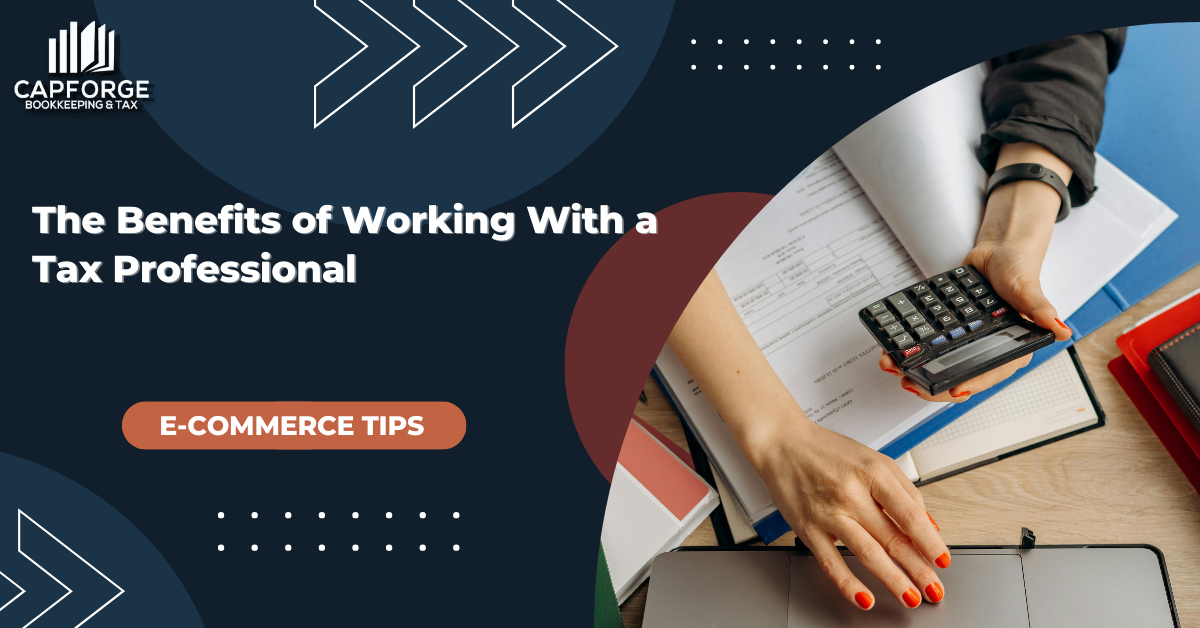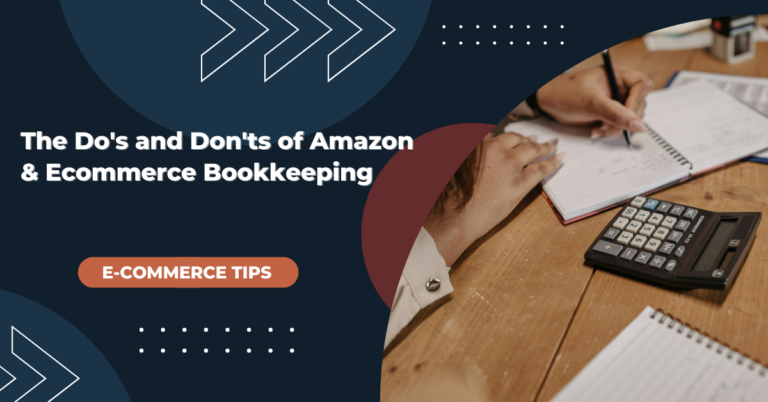The Benefits of Working With a Tax Professional
As a small business owner, you wear many hats. You’re the CEO, the marketer, the product developer, and often, the bookkeeper. But when tax season rolls around, the burden of navigating complex tax codes and filing forms can become overwhelming.
Enter the services of a tax professional. They are your secret weapons against the complexities of tax season and enable you to maximize your tax deductions. In this blog post, we’ll explore the many benefits of hiring a tax professional for your small business, from saving you time and money to ensuring compliance and peace of mind.
Peace of mind and reduced stress
Tax filing can be a significant source of stress and anxiety, particularly for small business owners with complex financial situations. The fear of making mistakes on tax forms, the uncertainty of deductions and credits, and the potential for audits can all contribute to an overwhelming feeling.
When your tax situation involves factors like owning a business, investing in multiple assets, or having income from multiple sources, the burden of navigating the tax code becomes even heavier.
A tax professional can be a valuable asset in these situations. Their expertise allows them to handle the intricacies of your return, ensuring accuracy and maximizing your potential benefits. This frees you from the time-consuming and stressful task, allowing you to focus on other important aspects of your business. You benefit from their expertise like:
- Knowledge Arsenal: Tax laws are dense and ever-changing. A professional stays up-to-date on deductions, credits, and regulations, ensuring you leverage every opportunity to minimize your tax burden.
- Gray Area Navigation: Tax codes often have ambiguities. A seasoned professional can analyze these gray areas, identify the most favorable interpretations for your situation, and represent you confidently if needed.
- Research and Analysis: Digging through receipts and financial documents is time-consuming. Tax professionals handle this meticulous task, ensuring all your information is accounted for accurately.
- Software Savvy: Tax software can be complex. Professionals are proficient in using these programs, eliminating the frustration of navigating them yourself.
- Audit Defense Shield: Audits can be stressful. Tax professionals can represent you during an audit, ensuring a smooth process and protecting your interests.
Maximizing deductions and credits
Working with tax professionals allows you to significantly lower your tax burden through deductions and credits. Here’s how they work:
- Tax deductions: These reduce your taxable income, the amount used to calculate your tax bill. Let’s say you earn $50,000 and qualify for a $5,000 deduction. Your taxable income becomes $45,000, potentially placing you in a lower tax bracket and reducing your overall tax owed.
- Tax credits: These directly reduce the amount of tax you owe, dollar-for-dollar. For example, a $1,000 credit subtracts $1,000 from your tax bill. Credits can be even more impactful than deductions.
Both deductions and credits can significantly lower your tax bill. The key is to identify those you qualify for. Tax laws are complex and change frequently. This is where tax professionals come in.
Tax professionals stay up-to-date on the latest tax code changes through continuing education courses, professional organizations, and IRS updates. This knowledge allows them to navigate the ever-changing tax landscape and ensure you claim all the deductions and credits you deserve.
Here are a couple of examples of deductions and credits that businesses often miss:
- Research and Development (R&D) Credits: Many businesses, especially those outside of traditionally “research” fields, don’t realize they can claim credit for expenses incurred in improving existing products or processes. This can include things like prototyping and experimentation.
- Home Office Deduction: If you run your business out of a dedicated home office, you can deduct a portion of your rent, utilities, and other home-related expenses. There are specific requirements for claiming this deduction, so be sure to research them well.
These are just two examples, and there are many other potential deductions and credits out there depending on the specific business. It’s always a good idea to consult with a tax professional to ensure you’re taking advantage of all the benefits available.
Ensuring accuracy and avoiding errors
Filing accurate tax returns is crucial for a smooth and stress-free tax season. Inaccuracies can trigger penalties from the IRS, ranging from a percentage of underpaid taxes to significant fines. Additionally, inaccurate returns can raise red flags and increase your chances of being selected for an audit. An audit involves the IRS scrutinizing your tax filings, which can be a time-consuming and potentially expensive ordeal.
Tax professionals possess in-depth knowledge of complex tax regulations and deductions. They can meticulously review your income, expenses, and deductions to ensure everything is reported correctly and according to current tax laws. This expertise can significantly reduce the likelihood of errors and penalties.
Specialized knowledge of complex tax situations
While tax laws can be straightforward for simple situations, things can quickly become intricate for specific scenarios. Here’s where a tax professional’s expertise becomes invaluable.
For self-employed individuals and business owners, tax filing involves separating personal and business finances, tracking business expenses, and understanding specific deductions available for these categories. Tax professionals can guide you through these complexities, ensuring you claim all eligible deductions and avoid overpaying taxes.
Investment income comes with various tax implications, depending on the type of investment, holding period, and whether you’ve reinvested dividends or capital gains. A tax professional can navigate these nuances, helping you optimize your tax strategy and minimize your tax burden on investment income.
Finding the right tax professional
Here’s a more detailed breakdown to help you find a qualified tax professional who aligns perfectly with your needs:
Matching Expertise to Your Tax Situation:
- Start with a self-assessment: Consider the complexity of your tax picture. Do you have a straightforward return with just W-2 income and basic deductions? Or are you self-employed, have investments, or own rental properties? The more intricate your finances, the more specialized knowledge you’ll need in your tax preparer.
- Explore different credentialed professionals:
- Certified Public Accountants (CPAs): These highly qualified individuals hold the most extensive credentials and can tackle a broad range of tax services. Beyond return preparation, they can offer tax planning strategies and represent you during an IRS audit. They’re ideal for complex tax situations or business owners.
- Enrolled Agents (EAs): Licensed by the IRS, EAs are specialists in tax preparation, representation, and appeals. They’re a great choice for navigating intricate tax situations or dealing with the IRS directly.
- Tax Attorneys: While not typically involved in everyday tax prep, tax attorneys are invaluable for resolving complex tax issues or legal matters like tax disputes. They’re best suited for those facing audits or tax law problems.
- Certified Public Accountants (CPAs): These highly qualified individuals hold the most extensive credentials and can tackle a broad range of tax services. Beyond return preparation, they can offer tax planning strategies and represent you during an IRS audit. They’re ideal for complex tax situations or business owners.
Verifying Credentials and Qualifications:
- Leverage the IRS directory: The IRS directory (IRS directory of federal tax return preparers with credentials and select qualifications) is a valuable resource. You can search for tax preparers in your area by zip code and verify their PTIN (Preparer Tax Identification Number, a base requirement). Look for professionals with additional designations like CPA or EA for a higher level of expertise.
Finding the Perfect Fit Beyond Credentials:
- Fees and Communication Style: Don’t be shy about asking about fee structures. Do they charge by the hour, have a flat fee for your type of return, or offer tiered pricing based on complexity? Inquire about their communication preferences (phone, email, in-person meetings) and how often you can expect updates on your return’s progress.
- Seek referrals and reviews: Talk to friends, family, or colleagues who’ve used tax professionals in the past. They might have valuable insights into their experience. While online reviews can offer some guidance, be cautious – a few bad reviews shouldn’t necessarily disqualify a professional. Consider the overall picture and the reviewer’s specific situation.
- Schedule a consultation: Many tax professionals offer a free consultation to discuss your tax situation and answer any questions you might have. This is a fantastic opportunity to assess their expertise, and communication style, and see if their personality meshes well with yours. Feeling comfortable with your tax professional is key to a smooth and successful tax filing experience.
Remember, the best tax pro for you is someone who possesses the right qualifications to handle your specific tax needs, offers a communication style that suits you, and with whom you feel confident and secure. Take your time with the selection process – a little effort upfront can save you time, money, and stress come tax season.
Conclusion
By now, you’ve hopefully seen the significant advantages of bringing in a tax professional. Their expertise can save you time, money, and the stress of navigating the ever-changing tax landscape. For small businesses especially, ensuring accurate tax filing is crucial for financial stability and growth.
At CapForge, we understand the unique needs of small businesses. Our team of tax experts combines in-depth knowledge with a personalized approach to ensure your tax return is filed accurately and maximizes your deductions.
Feel free to fill out the form below, and we’ll get in touch with you shortly.








